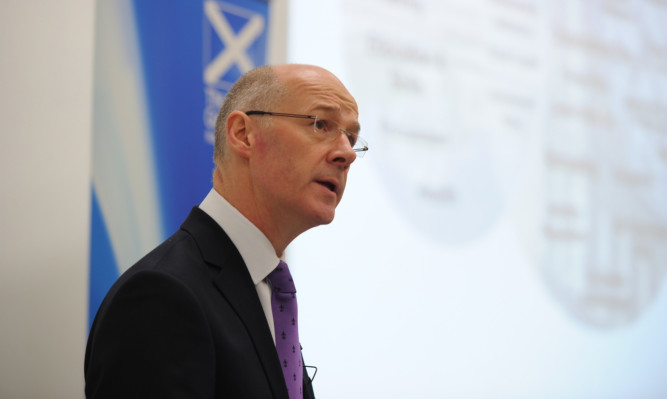Deputy First Minister John Swinney has launched a three-pronged attack on Westminster’s alleged lack of transparency over welfare, defence and finance.
The SNP MSP said the Department for Work and Pensions (DWP) has yet to return his calls about the devolution of welfare, the Ministry of Defence (MoD) has “never been particularly open” about its activities in Scotland, and the Treasury’s lack of consultation on its November spending review is holding up the Scottish Budget.
SNP MSP Rod Campbell asked Mr Swinney if he agrees with former prime minister Gordon Brown’s remarks that the full implementation of the Smith Commission’s welfare proposals are being held back by “the dogmatism and resistance of Iain Duncan Smith’s Department for Work and Pensions, which seem determined for there to be a blanket imposition of welfare cuts across the entire UK”.
Mr Swinney said: “There are a whole range of information requests that the Scottish Government has made to the DWP over a sustained period of time to assist us in the implementation of these powers and responsibilities which they have legislated for which we are still awaiting that information to be returned to us.
“I do encourage the DWP to actively co-operate in providing the information to exercise these responsibilities, and of course that is crucial because it will enable us to take distinctive decisions on welfare and that is what people would expect from devolution.”
Mr Swinney said he has been prevented from bringing forward his Budget by uncertainties over spending cuts in England which could impact on the Scottish block grant.
“UK Government policy decisions that result in reductions in spending in England impact the Scottish budget as a whole,” he said.
“The processes in place for calculating the Scottish block does not allow us to identify the direct impact of changes in one specific policy area.
“However, with a reduction in teaching grant spend in England of over £3 billion in real terms since 2011/12, the overall impact on the Scottish block grant has obviously been significant.
“For illustrative purposes, a population share of £3 billion would represent £298 million.
“One more recent example is that the UK Government’s proposals for an apprenticeship levy will shift the burden of payment of apprentices from the public purse to individual companies, and as a consequence of that the relevant budget in the UK will be reduced and there will be a consequential effect on the Scottish budget.
“That is one reason why it would be folly for me to bring forward a Budget before I see the outcome of the UK Government spending review in November.”
Mr Swinney also cast doubt on the MoD’s projections that its plan to upgrade the Faslane submarine base on the Clyde would sustain 1,500 jobs.
“It is not possible for the Scottish Government to undertake a meaningful assessment of the decision to bring the new Astute class submarine into service at HMNB Clyde until the UK Government sets out a detailed timetable and breakdown of Royal Navy personnel and dependants that are expected to transfer to Scotland,” he said.
“While we support investment in conventional defence capabilities, we are sceptical about the UK Government’s projections for future personnel numbers at Faslane given previous promises of a major uplift in army personnel in Scotland and investment in the defence estate, such as the promised new barracks at Kirknewton, have not materialised.”
He added: “To be blunt, in all this great spirit of intergovernmental working I have never found the MoD to be particularly open.”
